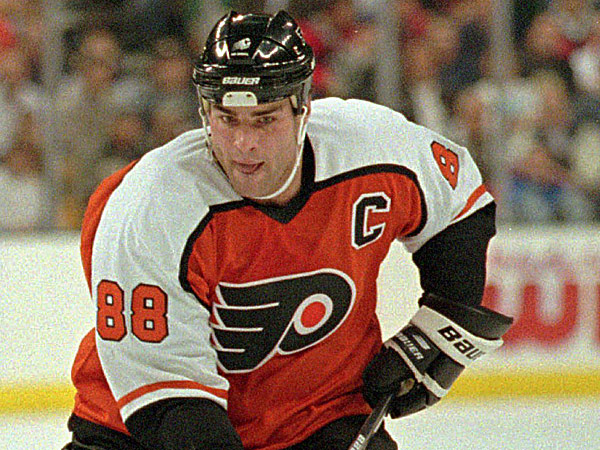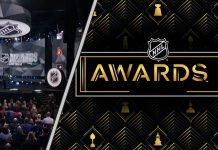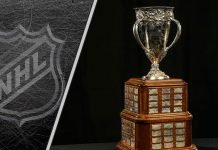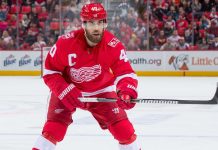July 6 NHL History
Two members of the Hockey Hall of Fame share this birth date.
1930: George Armstrong, captain of the Toronto Maple Leafs‘ four Stanley Cup-winning teams in the 1960s, is born in Skead, Ontario.
Armstrong plays two games with the Maple Leafs as a 19-year-old in 1949-50. Two years later, he’s a regular and is named captain in 1957-58.
Armstrong isn’t especially fast and doesn’t have great hands, but he becomes one of the NHL’s best two-way players. Though he never scores more than 23 goals or 51 points in a season, few players are better in the corners. Armstrong helps the Maple Leafs to the Stanley Cup Final in 1960, and to championships in 1962, ’63 and ’64. Toronto returned to the Final again in 1967 and upset the favored Montreal Canadiens in six games, with Armstrong’s empty-netter sealing a 3-1 Cup-clinching victory.
Armstrong retires after the 1970-71 season with 713 points (296 goals, 417 assists) in 1,187 regular-season games, and 60 points (26 goals, 34 assists) in 110 playoff games. He is voted into the Hall of Fame in 1975.
1948: Defenseman Brad Park, who undoubtedly sees Armstrong play before becoming a star in his own right, is born in Toronto. However, Park winds up with the New York Rangers, who make him the No. 2 player chosen in the 1966 NHL Amateur Draft. Two years later, he’s a full-time Ranger and becomes one of the greatest defensemen in their history. Park is a First-Team All-Star three times and a Second-Team All-Star twice with the Rangers. He helps New York advance to the Stanley Cup Final in 1972, but the Rangers lose to Bobby Orr and the Boston Bruins.
Three years later, Park winds up as Orr’s teammate when he’s traded to Boston along with center Jean Ratelle for center Phil Esposito and defenseman Carol Vadnais. He’s a First-Team All-Star twice with Boston, though he and Orr play very little together because of Orr’s knee injuries. Park finishes his NHL career with the Detroit Red Wings in 1985 and retires with 896 points (213 goals, 683 assists) in 1,113 games. The one thing he doesn’t do is win the Cup; the Bruins make the Final in 1977 and ’78 but lose to Montreal.
Park joins Armstrong in the Hall in 1988.
1995: Philadelphia Flyers center Eric Lindros wins the Hart Trophy as regular-season MVP. He joins three-time winner Bobby Clarke as the only Flyers to win the award after finishing with 70 points (29 goals, 41 assists) in 46 games during the lockout-shortened 1994-95 season. Lindros also wins the Lester B. Pearson Award (now the Ted Lindsay Award), given to the most outstanding player as voted on members of the NHL Players’ Association.
At the same ceremony, Peter Forsberg of the Colorado Avalanche, part of the package that the Flyers gave up to get Lindros in a trade, wins the Calder Trophy as the NHL’s top rookie. Ron Francis of the Pittsburgh Penguins wins the Frank Selke Trophy as the top defensive forward and the Lady Byng Trophy for skillful and gentlemanly play. Paul Coffey of the Red Wings wins the Norris Trophy as the NHL’s top defenseman for the third and final time.






